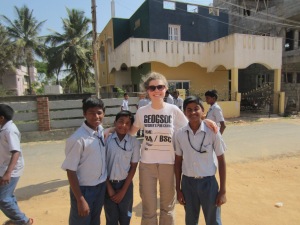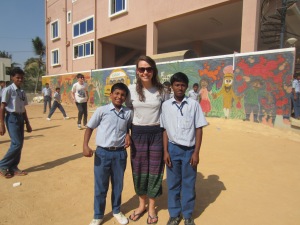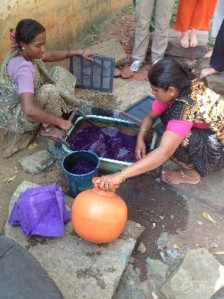Young people gathered
Row by row
Line by line
Connected by source
Eyes fixed on mine
Their smiles are waking
Our hearts are breaking
We’re worlds apart
Their great lives in the making
Delight on faces
Grins ear to ear
Only a small act
But a big impact here
Same old story
Arrive befriend leave
Hard to tear away
But in their future we believe
Author Archives: Pop Geog in Bangalore
Post by Hayley – Day 2 Yuvalok Visit
YuvoLok’s inspiring work began in 1993 as a non-governmental organisation hoping to empower young street/slum children. The organisation invests in the lives of underprivileged children in the city, providing them with an education regardless of their caste and religion. Each of these children are subject to infection, disease and malnutrition, unable to access any form of healthcare or education. The organisation’s investment in thousands of these boys and girls lives over the past 20 years, has not only led to an increased confidence in their future, but also a discovery of their value and potential.
With the help of donations, the organisation is able to provide tuition, two meals, stationary and uniforms, as well as more practical provisions such as healthcare and transport to and from the schools. Access to computer/science laboratories and a library, has led to an impressive and well-rounded breadth of knowledge. They aspire to be more than their parents and instead work towards being able to provide for their families and inspire others. This in turn will help to reduce levels of inequality and deprivation among India’s vast population. Girls in particular, have the opportunity to branch away from traditional employment as maids and cooks.
On a personal note, I believe that the work taking place at Yuvolok is inspiring. Having spoken and interacted with the children at the organisation, it is clear that they appreciate the opportunity to learn and move beyond traditional employment and life styles. Each child seemed excited to learn new things and develop their understanding of not only their own culture, but that of other countries as well.
Post by Adam – Day 2 Seminar
Our first appointment of the day was a seminar held by members of the Department of Mental Health Education at the National Institute of Mental Health and Neuro-Sciences. To begin with, we discussed some of our initial impression of India and Bangalore, commenting on numerous things from the traffic to the visible inequalities, while discovering the importance of noting down the initial impressions of the area where the research will take place. Following on from this we had a presentation on power in the context of research and finally discussed and asked questions about the interviews we would be conducting and what we could expect.
Post by Emma – Day 1 Village Tour
The Belaku trust has grown upon learning from their mistakes and replacing youthful hubris with humility and pragmatism. They are not trying to improve the lives of everyone, but if they can build a successful model here, maybe others can reproduce the same results elsewhere. The director, Saras, revealed that although she thinks that there has been progress in improving maternal healthcare in India, the progress has been far too slow. She asked if I knew the saying ‘there are lies, damned lies and statistics’ and said that never has there been a place where this is as true as it is in India. Although officially the number of women receiving prenatal care has increased, qualitative studies have revealed that hardly any of these women had their blood pressure checked or received a urine test. Saras talked at length about the caste system and the difficulties that the trust has faced trying to work against the system and encourage equality. She wishes to expand the work than Belaku does by teaching the women basic literacy and math skills, right now all they can do is sign their names but Saras believes that some literacy skills will go even further towards improving these women’s lives. Introduced us to the midwife who at one time served ten villages and a total of 5,000 people. Expected to visit each village once a week and complete malaria checks on all the children she was stretched beyond belief by the government policy. A problem that the midwife informed us of was the limited availability of fully trained midwives as well as transport, as often they are expected to walk between the villages, despite the physical toll and the use of time.
Post by Adam – Day 1 Village Tour
Our second day in India was spent getting to know the villages where we would be conducting our interviews. On our way, we picked up Saras, one of the most incredible woman I had ever met, and one of the co-founders of the Belaku Trust, the charity that set up the income-generation projects where the woman worked. She told her life story and how she had ended up creating the Belaku Trust in order to help the most desperate women from the poorest families. We visited a typical middle class home of one of the women in the rural area who was kind enough to allow us in to show us the living area, the kitchen, and the silk worms they keep in racks that create silk. One of the most striking things we talked about was the caste system. It struck me that such social divides still occurred in a society and country that was well on its way to becoming a developed countries. Finally we visited the original income-generation project, a paper making workshop run by some of the women. We were given a demonstration of how the original sheets of paper were made, using chemical dyes, water and the sun, with leaves added to make patterns. So simple but such a massive impact on these women’s lives.




